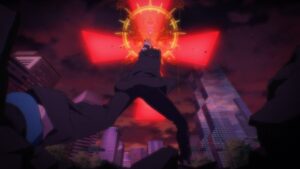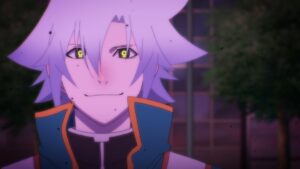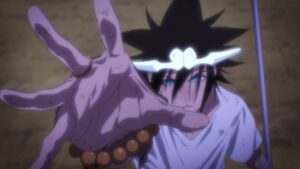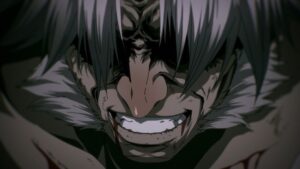I know it’s only been three months since The God of High School premiered, but given the density of the show’s second half, it feels like it’s been airing since April. I’m glad it’s over, if for no other reason than not having to blog it anymore. There are only so many ways to praise its visuals while criticizing [everything else] without falling into a repetitive rut. I won’t be writing a standalone final review for GOH, as that would be just another drop in the echo chamber of the series’ negative reception. Instead, I’ll attach some concluding thoughts about the show to the bottom of this post. Skip to the end for the wrap-up, or read the whole thing to relive the insanity of episodes 12 and 13 – the choice is yours.
One defense I will put forward for God of High School’s conclusion deals with its readability. I’m sure there are viewers out there whose primary issue with GOH sounds something like, “It makes no sense!” or “It’s too random!” On the contrary, I believe the bulk of the information necessary to understand this episode was given to us weeks ago, and the Jegal Taek backstory at the start of episode 12 was the final piece of the puzzle. Jugok’s grandfather being a member of The Six was a tidbit we learned at the start of the team tournament arc, so it makes sense that he’d show up to avenge his grandson’s death. Mori’s godlike abilities were showcased in his battle with Ilpyo in episode 10, plus he’s had dreams foreshadowing his Monkey King identity as early as episode 3. Granted, this two-part conclusion had characters (and meteors) being teleported all over the place, which was rather sudden – but it wasn’t nonsense. The story has had one foot in the realm of gods for a while now, so to witness more abilities on that scale shouldn’t boggle anybody’s mind.
Whether the show’s various power struggles engaged you emotionally is another matter. They certainly didn’t for me – Nox’s goal of destroying the world wasn’t rooted in any discernable theology, and the last-minute flickers of Jegal Taek’s humanity couldn’t set him apart from the dozens of other villains Kenjirou Tsuda has voiced. I did like the bold use of color during the flashback he shared with his grandfather, though. There was an ugly twilight feeling to it, stained as the screen was with yellow shadows and filthy black walls during their talk. The pressure Jegal felt to be worthy of his grandpa’s inheritance drove him to kill the man, so the nauseating design of the scene worked very well. Unfortunately, GOH has been juggling so many plates as of late that there wasn’t a proper lead-up to that reveal; in the end, Jegal fulfilled his duties as a climactic punching bag and not much else. Even his temporary transformation into a baby after eating Ilpyo’s key couldn’t get me invested in his fate.
I’d love to say that the reveal of Mori’s true identity during their fight was much better, but it wasn’t. The animation certainly improved a couple notches after he called on Nyoibo (his transforming staff) for the first time, but the appearance of a headpiece was the biggest change that Mori himself underwent. Even when possessed by Seiten Taisei, the Monkey King himself, Mori was still calling out his pals’ names while delivering standard left and right hooks to the big mean villain who didn’t believe in friendship. Then phase two of the fight began, set to an insert song with lyrics about “standing tall” and this being “our time.” Yeesh. The whole second part of the Jegal battle felt like an ad for whichever musician was featured there – no doubt she has a bright future ahead of her with such memorable messages woven into her work. As for the aftermath of the fight, where we met “the progenitor of the human race” (we Evangelion now), the only thing that was going through my mind at that point was, “It’s finally over.”
If I were a glutton for punishment, I’d dig into these episodes’ smaller failures, such as the ugliness of the CG angels that invaded the city in episode 12, or the omission of Daewi and Mira’s fight against Jegal on the deserted island. But I don’t really care to waste any more words on the show’s conclusion, because frankly, it bored me. I had precisely the opposite reaction to the previous pair of episodes, because they were the ones that blew past the status quo and finally delivered us to the place where the series had always been headed. But episode 12’s battle in the streets of Seoul borrowed far too many elements from episode 10’s similar free-for-all, only adding the laughably small threat of nuclear missiles to the pile. And the final ep fell backwards into a shounen safety net (though it played host to some nice cuts once Mori went full Simian Lord). I can’t say I appreciated either the former’s familiarity or the latter’s predictability.
So, final thoughts on The God of High School: it wasn’t very good. After a stylish first episode that promised crazy hijinks and even crazier fight scenes, I probably should have guessed that it would devolve into madness, but I kept the faith for longer than most viewers. There were times when I was rewarded for that belief, as in episode 5, which conjured a decent Daewi story to counter the batshit wedding plot of the previous week. Judge Q’s bonkers fight against several Nox agents in episode 7 was another highlight, serving as a prime example of the show’s ability to push the visual envelope. In the end, though, GOH’s scale and character roster ballooned to the point of unsustainability. Its original tournament format allowed new players to be phased in and out of the story with minimal issues, so when that structure was abandoned, the whole thing spiraled out of control (entertaining as that spiral was to watch at its beginning).
Even though my opinion of the series is mostly negative, I don’t regret having covered it for the website. Sure, I could have used my time in other, better ways, but it was good practice to write about a rapidly declining show without giving in to whining or doomposting. Series director Seong-Hu Park will be heading up Jujutsu Kaisen’s production this fall, and while GOH was a stinker, he’s got a reputation as a great action director, so I’m still looking forward to his work. Thus one seasonal offering ends, destined to be forgotten in a handful of years, and another one begins, likely bound for the same fate. How many more Gods of High School will it take before I swear off anime for good? Sometimes I think the end is fast approaching, but on clear-eyed days like today, I know it’ll be a while yet before I quit this crazy business.
Thanks for reading, and see you next season.





So what would you rate this show if this was a series review? Astounding how a show where literally God himself gets blown up by meteors and nukes over Seoul, and literally every citizen in that city is magically evacuated still makes me feel absolutely nothing despite the insanity that occurred.
At this point of the webtoon, this is the part where even the source material completely blows up and shits the bed with more nonsensical trite that goes beyond the mess seen in this adaptation. God forbid they even attempt to adapt more if a season 2 is announced.
Also, did you notice the pervasive Crunchyroll product placement everywhere? So distracting.
I’m not a believer in assigning numerical scores to visual art (the ones I’ve provided in the past have been out of obligation to our house style), so I’d say Not Very Good/10 covers it. Whatever number you assume that to be, plug it in and that’s my score. Needless to say, if there’s a season 2, I won’t be watching.
I saw a few CR logos throughout the show’s run, mostly on the sides of the MMA ring where the tournament matches took place. That sort of thing is becoming more common in modern anime, though; Great Pretender put Production I.G’s logo on the planes during the Singapore Sky arc, for example (Wit is a subsidiary of I.G).